CORPORATE ACTION: Clorox
Clorox Highlights Strategies For Achieving Net Zero 2050 Goals
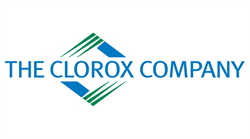 Clorox has added new science-based targets to its climate strategy, which the company said will help it achieve its net zero emissions goals by 2050. Clorox aims to achieve its net zero goals by 2050 by reaching 50% combined reduction in virgin plastic and fiber packaging by 2030; getting to 100% recyclable, reusable, or compostable packaging by 2025; and doubling the use of plastic PCR in packaging by 2030.[Image Credit: © Clorox]
Clorox has added new science-based targets to its climate strategy, which the company said will help it achieve its net zero emissions goals by 2050. Clorox aims to achieve its net zero goals by 2050 by reaching 50% combined reduction in virgin plastic and fiber packaging by 2030; getting to 100% recyclable, reusable, or compostable packaging by 2025; and doubling the use of plastic PCR in packaging by 2030.[Image Credit: © Clorox]
CORPORATE ACTION: Henkel
Henkel Unveils Efforts To Reduce Plastic Waste And Increase Recycling
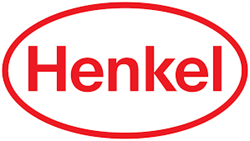 Henkel presents its current achievements and milestones reached as it works to achieve packaging sustainability and deal with plastic pollution. The company said it has achieved 89% reusable or recyclable packaging against its target of 100%. Incorporating recycled content into plastics results in grayish or opaque plastic, which can sometimes deter consumers from buying products with recycled packaging. Henkel aims to achieve its goal of 50% less virgin plastic in packaging by using recycled aluminum. Henkel believes that by reaching the first two targets, the company can get closer to achieving its third target of zero plastic waste making its way into nature.[Image Credit: © Henkel]
Henkel presents its current achievements and milestones reached as it works to achieve packaging sustainability and deal with plastic pollution. The company said it has achieved 89% reusable or recyclable packaging against its target of 100%. Incorporating recycled content into plastics results in grayish or opaque plastic, which can sometimes deter consumers from buying products with recycled packaging. Henkel aims to achieve its goal of 50% less virgin plastic in packaging by using recycled aluminum. Henkel believes that by reaching the first two targets, the company can get closer to achieving its third target of zero plastic waste making its way into nature.[Image Credit: © Henkel]
CORPORATE ACTION: Procter & Gamble
Procter & Gamble Pushes Digital Watermarks As Tool To Improve Packaging Recycling
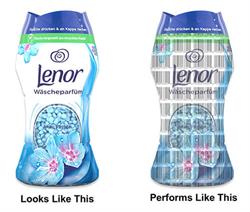
Procter & Gamble is promoting digital watermarks as a means of improving sorting efficiency at recycling facilities. Digital watermarks are about the size of a postage stamp and can store information on packaging type and materials used. The company will test the feasibility of using digital watermarks in Europe by adding them to more than 100 P&G products.[Image Credit: © Procter & Gamble]
CORPORATE ACTION: Unilever
Hindustan Unilever Uses Recyclable Plastic Bottles For Surf Excel Detergent Brand
.jpg&width=250&height=188)
Hindustan Unilever said its Surf Excel brand of laundry detergents will come packaged in recyclable bottles with 50% post-consumer recycled plastic and will use 100% biodegradable active ingredients. HUL launched the Surf Excel Matic Liquid detergent for washing machines in 2016. The company has partnered with Banyan Nation to develop bottles made with less virgin plastics.[Image Credit: © Unilever plc]
Unilever UK & Ireland Executive Highlights Company’s Efforts To Promote Refillable Packaging
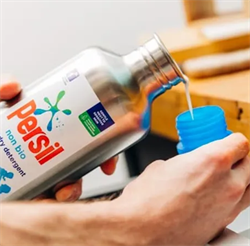
Unilever UK & Ireland’s general manager, Sebastian Munden, discussed how his company is developing ways that shoppers can use refillable containers when buying products. Several Unilever products are part of retailer Tesco’s test run for refillable offerings, including Persil laundry detergent and Simple hand wash. He also highlighted how plastic pollution is affecting the consumer goods industry. Munden acknowledged that widescale adoption of refillable packaging poses some serious challenges; however, it also has the potential to significantly improve sustainability and eliminate plastic packaging waste.[Image Credit: © Unilever plc]
CAMPAIGNS, COMMITMENTS & NGOs
Greenpeace USA Report Highlights Business Links Between CPG Companies And Big Oil’s Growing Plastic Operations
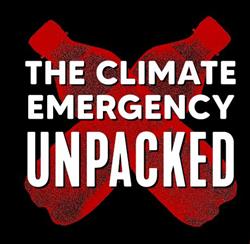 Greenpeace USA said consumer goods companies, including Coca-Cola, PepsiCo, Unilever and Nestlé, are pushing the growth of plastic production and endangering the global climate and communities worldwide. The group’s report, The Climate Emergency Unpacked: How Consumer Goods Companies are Fueling Big Oil’s Plastic Expansion, highlights the business relationships between giant consumer goods companies and fossil fuel companies. The report highlights industry estimates that plastic production could triple by 2050. It also looks at the general absence of transparency regarding emissions from plastic packaging.[Image Credit: © Greenpeace USA]
Greenpeace USA said consumer goods companies, including Coca-Cola, PepsiCo, Unilever and Nestlé, are pushing the growth of plastic production and endangering the global climate and communities worldwide. The group’s report, The Climate Emergency Unpacked: How Consumer Goods Companies are Fueling Big Oil’s Plastic Expansion, highlights the business relationships between giant consumer goods companies and fossil fuel companies. The report highlights industry estimates that plastic production could triple by 2050. It also looks at the general absence of transparency regarding emissions from plastic packaging.[Image Credit: © Greenpeace USA]
India Announces Plastics Pact Ahead Of Other Asian Countries
.png&width=250&height=131) WRAP has partnered with WWF India and the Confederation of Indian Industry to launch the India Plastics Pact during the CII’s 2021 sustainability summit in New Delhi. The India Plastics Pact is the latest in WRAP’s growing list of Pacts worldwide and the first in Asia. The country produces 9.46 million tons of plastic waste every year, with 40% uncollected. Also, 43% of plastics manufactured in India is used for packaging, mostly for single use.
WRAP has partnered with WWF India and the Confederation of Indian Industry to launch the India Plastics Pact during the CII’s 2021 sustainability summit in New Delhi. The India Plastics Pact is the latest in WRAP’s growing list of Pacts worldwide and the first in Asia. The country produces 9.46 million tons of plastic waste every year, with 40% uncollected. Also, 43% of plastics manufactured in India is used for packaging, mostly for single use.[Image Credit: © WRAP]
MARKET NEWS
Eurokey Recycling To Build UK’s First Recycling Plant For Supermarket Films and Flexible Plastics
 Eurokey Recycling Ltd has revealed its plan to invest £15 million in a recycling infrastructure designed for processing supermarket films and flexible plastics returned by shoppers. The recycling facility will be the first of its kind in the UK and will have 75,000 square feet of space and processing capacity of 70,000 tonnes each year. It will be located in Kettering, Northamptonshire, and is expected to start operating in summer 2022.[Image Credit: © EUROKEY RECYCLING GROUP]
Eurokey Recycling Ltd has revealed its plan to invest £15 million in a recycling infrastructure designed for processing supermarket films and flexible plastics returned by shoppers. The recycling facility will be the first of its kind in the UK and will have 75,000 square feet of space and processing capacity of 70,000 tonnes each year. It will be located in Kettering, Northamptonshire, and is expected to start operating in summer 2022.[Image Credit: © EUROKEY RECYCLING GROUP]
Latin America Has Long Way To Go When It Comes To Sustainable Packaging
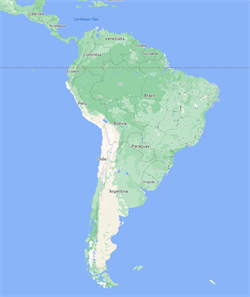
Consumer goods manufacturers in Latin America need to expand their efforts to promote sustainable packaging in the region. Data from Euromonitor’s Product Claims and Positioning System has revealed that only 5.6% of products looked at have sustainable packaging claims. Manufacturers with sustainable packaging initiatives include Unilever’s work with the Pulpex consortium to develop a paper-based detergent bottle for its Omo brand; L’Occitane’s beauty and personal care products in refill packages; and Softys’ launch of paper-based packaging for its Elite brand in Chile.[Image Credit: © Google Maps]
POLICY, REGULATION & LEGAL
China Gets Tough Versus Plastic Pollution By Announcing New Five-Year Plan
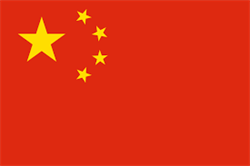 China has announced a five-year plan, 2021–2025, that will expand the country’s plastic recycling and incineration capabilities. The policy announcement also aims to promote environment-friendly plastic products and to act on the “overuse of plastic” in packaging and agriculture. The country’s National Development and Reform Commission declared that China needed to improve its “chain of plastic pollution control”. The five-year plan will push retailers and delivery companies to reduce plastic packaging and expand the country’s urban waste incineration rates to about 800,000 tons per day by 2025.[Image Credit: © No copyright]
China has announced a five-year plan, 2021–2025, that will expand the country’s plastic recycling and incineration capabilities. The policy announcement also aims to promote environment-friendly plastic products and to act on the “overuse of plastic” in packaging and agriculture. The country’s National Development and Reform Commission declared that China needed to improve its “chain of plastic pollution control”. The five-year plan will push retailers and delivery companies to reduce plastic packaging and expand the country’s urban waste incineration rates to about 800,000 tons per day by 2025.[Image Credit: © No copyright]
INNOVATION & TECHNOLOGY
Bioplastics International Pushes PVA Bags As Environment-Friendly Alternative To Plastic Shopping Bags
.jpg&width=250&height=188)
Bioplastics International president and CEO, Garrett Valentino, said his company’s polyvinyl alcohol (PVA) bags are water soluble. Unlike conventional bioplastics, the bags do not biodegrade and aren’t compostable. The company has a factory in Phoenix for small production runs and a large research and manufacturing facility in China for high-output production needs.[Image Credit: © Bioplastics International]
Zotefoams Offers Re-engineered Plastic Packaging With Mixed Material Barrier Qualities
 Zotefoams VP for strategy, Neil Court-Johnston, said mixed material packaging is the “enemy” of sustainable packaging and recycling. His company offers ReZorce mono-material recyclable barrier packaging as an environment-friendly as an alternative. He said aseptic carton packaging with a laminated surface is “extremely difficult or impossible to recycle” and usually ends up in landfill or incinerators. Zotefoams “re-engineers” plastic materials, such as high-density polyethylene, to add barrier properties normally found in mixed material packaging.[Image Credit: © Zotefoams ]
Zotefoams VP for strategy, Neil Court-Johnston, said mixed material packaging is the “enemy” of sustainable packaging and recycling. His company offers ReZorce mono-material recyclable barrier packaging as an environment-friendly as an alternative. He said aseptic carton packaging with a laminated surface is “extremely difficult or impossible to recycle” and usually ends up in landfill or incinerators. Zotefoams “re-engineers” plastic materials, such as high-density polyethylene, to add barrier properties normally found in mixed material packaging.[Image Credit: © Zotefoams ]
PDK Meets Criteria For Infinitely Recyclable Plastic Material
 In April 2021, a team of scientists published a study detailing how poly(diketoenamine) or PDK could be manufactured at scale and made commercially viable. PDK was first discovered by scientists from the Lawrence Berkeley National Laboratory who noticed that the material breaks down to its original monomers. These monomers came with features that were as good as new and could be “re-polymerized” into new material without any loss in quality.[Image Credit: © UC Berkeley]
In April 2021, a team of scientists published a study detailing how poly(diketoenamine) or PDK could be manufactured at scale and made commercially viable. PDK was first discovered by scientists from the Lawrence Berkeley National Laboratory who noticed that the material breaks down to its original monomers. These monomers came with features that were as good as new and could be “re-polymerized” into new material without any loss in quality.[Image Credit: © UC Berkeley]
Copyright 2026 Business360, Inc.

